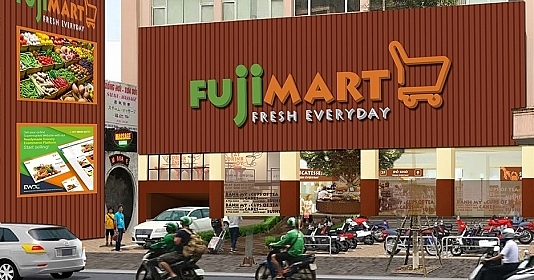Foreign retailers raise the local game
 |
| Foreign retailers raise the local game, illustration photo |
Under commitments of the Comprehensive and Progressive Trans-Pacific Partnership (CPTPP), five years after the agreement comes into force, Vietnam will abolish the regulation that foreign retailers wanting to open their second outlets in Vietnam must ask local authorities for permission and be subject to Economic Needs Test (ENT) criteria.
According to local experts, the elimination of those obstacles may result in foreign retailers flocking to Vietnam.
The latest newcomer taking part in the retailer race in Vietnam is Fujimart Vietnam Retail, a joint venture between Japanese trading house Sumitomo and local retail and real estate conglomerate BRG Group. Fujimart hopes to use its modern Japanese-style retail expertise to attract increasingly well-off consumers in Vietnam.
The number of foreign retailers will increase at a steady pace, especially from 2024 as the ENT will be removed for retailers coming from the other 10 CPTPP members.
“That means foreign-invested businesses could set up their own retail outlets anywhere easily for distributing their products to end-users across the agreement’s countries, and so competition will increase sharply,” said Dinh Thi My Loan, chairwoman of the Association of Vietnam Retailers.
The ENT refers to criteria for the establishment of retail outlets that Vietnam has set in order to protect the domestic retail industry. It does not apply to foreign retailers in case they set up retail outlets of less than 500 square metres each in areas with sufficient infrastructure for commercial activities.
Vu Vinh Phu, former chairman of the Hanoi Supermarket Association told VIR, “Foreign-invested retail chains have captured 50 per cent of total market share. Sales are seven- or eight-fold higher than domestic equivalents.”
Giants such as Central Group, Lotte, AEON and Auchan have reshaped the country’s retail.
In the fashion and apparel sector, Japanese brand Uniqlo has acquired 35 per cent of a Vietnamese fashion company, and plans to launch its first store in Vietnam this year. Along with Zara and H&M, Uniqlo is the third brand in the top five of the world’s biggest fashion brands to set foot in Vietnam, putting significant pressure onto leading Vietnamese companies which are making up a modest market share and only 20 per cent of the total export turnover.
In the context that Vietnam is opening the door for foreign retailers, local counterparts are being forced to invest in technology to increase their competition capacity.
Vietnamese supermarket chain VinMart has launched Scan & Go in 13 of its stores. Shoppers can use the VinID app to scan the barcode on products before adding them to their virtual cart in the app. After payment, they can arrange to have their order packed and come back to collect it later, or have it delivered within two hours. The app will also provide information about product manufacturers and origins. According to the plan, from March 2019, shoppers using Scan & Go will also be eligible for promotional offers and discounts on their purchases.
Along with VinMart, Saigon Co.op has also come up with many solutions to continue attracting customers. The first is the diversification and modernisation of retail models, and creation of unique features in line with market trends.
To reach customers effectively in the online environment, most retail models of Saigon Co.op such as Co.opmart and Co.op Food use digital tools and have their own social networking site to interact with customers.
“Co.opmart supermarkets are rapidly adopting the Scan & Go tool to help customers shop quickly. The application of this tech makes shopping at Co.opmart easy, convenient, and fast,” a Saigon Co.op representative said.
This year the group, besides continuing to expand the network and raise goods standards, will also launch a new modern shopping model and apply technology throughout all retail models.
It is still early to estimate the effects from these apps at VinMart and Saigon Co.op. However, Mobile World Investment Corporation (MWG) is an outstanding example for enterprises succeeding through investing in technology.
At Hanoi’s Investment, Marketing, and Retail forum on March 20, Tran Trong Tuyen, general secretary of the Vietnam E-commerce Association said that many businesses may join the e-commerce sector and reap positive results, under the condition that they are able to take advantage of technology. Getting involved in the sector will cost them a large amount of capital if they fail to apply technology to their operations.
“There is a difference in offline revenue of FPT Shop and online revenue of MWG. In the 2014-2018 period, the offline revenue of FPT Shop increased 2.3 times from VND6.56 trillion ($285.5 million) to VND15.3 trillion ($665.1 million). Meanwhile, the online revenue of MWG rose 14.5 times from VND851 billion ($37 million) to VND12.35 trillion ($537 million). In order to acquire this revenue, MWG have made a massive and methodical investment in technology and the IT team,” said Tuyen.
What the stars mean:
★ Poor ★ ★ Promising ★★★ Good ★★★★ Very good ★★★★★ Exceptional
Themes: CPTPP
Related Contents
Latest News
More News
- Ho Chi Minh City launches plan for innovation and digital transformation (February 25, 2026 | 09:00)
- Vietnam sets ambitious dairy growth targets (February 24, 2026 | 18:00)
- Masan Consumer names new deputy CEO to drive foods and beverages growth (February 23, 2026 | 20:52)
- Myriad risks ahead, but ones Vietnam can confront (February 20, 2026 | 15:02)
- Vietnam making the leap into AI and semiconductors (February 20, 2026 | 09:37)
- Funding must be activated for semiconductor success (February 20, 2026 | 09:20)
- Resilience as new benchmark for smarter infrastructure (February 19, 2026 | 20:35)
- A golden time to shine within ASEAN (February 19, 2026 | 20:22)
- Vietnam’s pivotal year for advancing sustainability (February 19, 2026 | 08:44)
- Strengthening the core role of industry and trade (February 19, 2026 | 08:35)

 Tag:
Tag:




















 Mobile Version
Mobile Version